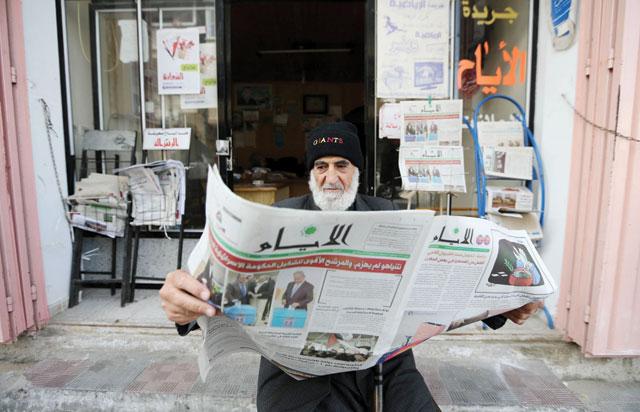You are here
Israel’s Netanyahu mired in post-vote crisis with US
By AFP - Mar 24,2015 - Last updated at Mar 24,2015
OCCUPIED JERUSALEM — Prime Minister Benjamin Netanyahu was on Tuesday facing one of Israel's worst-ever confrontations with the White House, which has shown absolutely no sign of accepting his post-election attempts at contrition.
Just a week after winning a shock election victory, earning a third consecutive term in office, he remains mired in a diplomatic crisis with US President Barack Obama's administration.
Since the March 17 election, not a day has passed without a US comment, official or otherwise, on the implications of Netanyahu's election rhetoric.
During campaigning, he ruled out a Palestinian state and on polling day played the race card to drum up more rightwing votes, at the expense of Israel's Arab minority.
Although Netanyahu has since tried to backtrack — emphatically denying he reneged on the idea of a two-state solution and offering an apology of sorts to Arab Israelis — it appears the damage has been done.
The latest headlines concern a Wall Street Journal article in which US officials accused Israel of spying on nuclear negotiations with Iran aimed at reaching a deal that Netanyahu vociferously opposes.
“It is one thing for the US and Israel to spy on each other. It is another thing for Israel to steal US secrets and play them back to US legislators to undermine US diplomacy,” a senior official told the paper.
The report was flatly denied by Israeli Foreign Minister Avigdor Lieberman as “incorrect and inaccurate”.
“Of course Israel has its security interests and we have good intelligence services. But we don’t spy on the United States,” he told army radio.
‘Unprecedented’ hostility
On Monday, two senior US officials made clear that Netanyahu’s post-election attempts at backtracking had failed, questioning his reliability in unusually tough terms.
“After the election, the prime minister said that he had not changed his position, but for many in Israel and in the international community, such contradictory comments call into question his commitment to a two-state solution,” White House Chief of Staff Denis McDonough told J-Street, a left-leaning pro-Israel lobby group.
“We cannot simply pretend that those comments were never made, or that they don’t raise questions about the prime minister’s commitment to achieving peace through direct negotiations,” he said.
The State Department echoed that message.
“When you say things, words matter. And if you say something different two days later, which do we believe? It’s hard to know,” deputy spokesperson Marie Harf told a briefing on Monday.
“Who knows? We can’t read his mind.”
Jonathan Rynhold, an expert on US-Israel relations at Bar Ilan University, said called the level of mutual animosity “unprecedented”.
“The public nature of the mutual hostility is a new low,” he told AFP.
“I don’t think we’ve ever had as bad a relationship between a president and a prime minister and of course that has policy consequences — will the US always use its veto for Israel?”
Last week, the White House said it may withdraw crucial diplomatic cover for Israel at the UN Security Council as part of a re-evaluation of US policy following Netanyahu’s remarks.
The United States — a veto-wielding Security Council member — has frequently opposed moves at the UN to recognise a Palestinian state, saying that must be part of a negotiated peace deal.
Destabilising democracy?
Withdrawing that cover could prove tricky for Israel, especially if the Palestinians resubmit a resolution setting an end date for the occupation as they did late last year.
If Netanyahu angered the Obama administration this month by defiantly addressing Congress in a bid to scupper an emerging White House-backed nuclear deal with Iran, his election comments really added fuel to the fire.
What appeared to have rattled Obama most was Netanyahu’s attempt to mobilise rightwing voters by playing the race card, saying: “The rule of the rightwing is in danger: Arab voters are going to the polls in droves.”
“We indicated that that kind of rhetoric was contrary to what is the best of Israel’s traditions,” Obama said in an interview with The Huffington Post, suggesting that such remarks undermined Israeli democracy.
On Tuesday, Israel
Hayom, a freesheet widely seen as a mouthpiece for Netanyahu, accused the Obama administration of undemocratic behaviour in refusing to accept the election results.
“It seems that the White House has crossed every boundary,” it said.
“The White House wants a Palestinian state now. The new government that was elected in Israel does not want that. The White House’s problem with Netanyahu is one thing, but they ought to respect the Israeli voter,” it said.
“Isn’t that democracy?”
Related Articles
The White House on Wednesday scolded Israeli Prime Minister Benjamin Netanyahu following his re-election victory for abandoning his commitment to negotiate for a Palestinian state and for what it called "divisive" campaign rhetoric towards Israel's minority Arab voters.
OCCUPIED JERUSALEM — Prime Minister Benjamin Netanyahu and his main challenger Benny Gantz were neck and neck after Israeli elections on Tue
MAALE ADUMIM, West Bank — Israeli Prime Minister Benjamin Netanyahu’s record fifth term is likely to be dominated by corruption allegations,

















